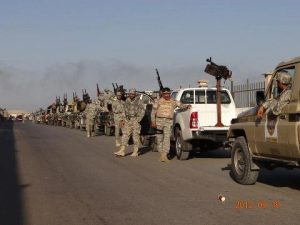
By Sami Zaptia.
Tripoli, 22 September:
A drive by the Libyan authorities to impose their authority and make some kind of headway in their efforts to control illegal militias took a major step last week.
A number of unlawful militias had since the Revolution occupied properties of former members of the ex-regime in the fashionable district of Sirraj and used them as their bases.
Over the last week the new Mobile Force, part of the official Libyan army, had been slowly clearing the western Tripoli district of Sirraj, about 16 kilometers from central Tripoli.
The area is full of large houses usually with generous gardens and swimming pools and had been a favourite of the expat community in Libya prior to the 17th February Revolution.
The policy had not been given any prior publicity by the authorities, and it is not clear if it is going to be a concerted effort to clear all the areas of Tripoli of unlawful militias.
What is clear is that there have so far been no reports of deaths or casualties as a result of this drive to purge Tripoli of these renegade militias. It is not clear if the militias are being arrested, are disbanding or whether they are moving further out of Tripoli’s periphery.
It is also not clear if the official army is going to occupy the properties so as to prevent the militias from returning to them after they have moved on.
If this drive to purge Tripoli of militias proves to be effective and successful, and in view of the events in Benghazi last night where unarmed civilian demonstrators virtually embarrassed militias into vacating their bases, this could prove to be the turning point in Libya’s efforts to move forward.
It could also prove to be the lasting testimony to the death of US ambassador Chris Stevens. There has definitely been a mood change in Libya since the sad murder of ambassador Stevens.
Libyans generally, and Benghazians especially, have been saddened and embarrassed at his death. Many feel ashamed and angered that the Libyan authorities were not able to protect a diplomat – a protection that is required by custom and law.
Moreover, Libyans have felt a guilt that a friend, an ally and a guest has not been extended the protection he deserved – especially in view of the help and friendship he had extended to Libya generally and Benghazi specifically during the Revolution.
It is hoped that the death of Chris Stevens will not pass in vain and that from the darkness and low that his death without a doubt represents – Libya will react positively and move on from the phase of revolution to the phase of building a strong viable state. [/restrict]








